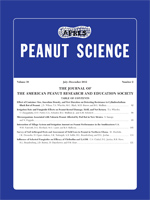
O. Giayetto, F.D. Morla, E.M. Fernandez, G.A. Cerioni, M. Kearney, M.B. Rosso, and M.G. Violante.
Peanut Science - Vol. 40 Issue 1 - Print ISSN 0095-3679
Peanut is an annual crop with indeterminate growth habits and different branching patterns. The combination of these parameters produces different modes of pod distribution in the soil, mainly due to spatial and temporal variation in the gynophore penetration and subsequent pod development.
Different levels of lateral and main stem branches have variable influences on plant yield. Branch influence on yield also is significantly different among virginia, runner, and spanish cultivars. The objective of this study was to describe and quantify the number and weight of pod determinations for each branch type, and to estimate the relationship with prevailing mean temperature and solar radiation during the respective moment. The study was carried out under field conditions using two genotypes sowed at three different dates. The differences in the relative contribution to pod yield provided by each branch are due to the critical period of determination of number and weight of pods. Critical periods differ between genotypes, and are dependent on the
growth habit and branching pattern. Branches with a greater contribution to pod yield (n+1 cotyledonary and others with 65 to 67%, and n+2 cotyledonary
with 24 to 26%) have an earlier onset, higher rate of appearance and pod growth, and longer duration of these critical stages. However, there was no difference in the amount of intercepted photosynthetically active radiation (IPAR) and mean temperature due to temporal overlap of these stages in the main branch categories (cotyledonary n+1 and n+2, and other n+1). Instead, the partitioning coefficient (p) was different among branch types, due to the sink strength (number and weight of pods) in both cultivars. Thus, p ranged 0.01 “0.32 and 0.01 “0.33 inUtre, and between 0.02 “ 0.24 and 0.03 “0.26 for number and weight of pods in Granoleico, respectively. This sink strength, in turn, is greater in the branches that first define the yield components, thus giving them a comparative advantage with respect to later ontogenetic development branches. These results suggest that to improve peanut yield it may be desirable obtain cultivar with lower indetermination growth level and more branch types of earlier onset.
Key Words: peanut, Arachis hypogaea L., branching pattern, branches pod production, growth habits, pod yield, and genotypes.
Departamento de Producción Vegetal, Facultad de Agronomía y Veterinaria - Universidad Nacional de Río Cuarto
Ruta 36 km 601, Río Cuarto, Córdoba - Argentina +54 (0358) 467-6159 / 504 / 509
Mail: deptoprodvegetal@ayv.unrc.edu.ar
